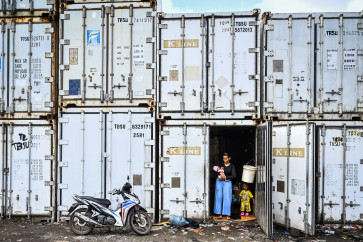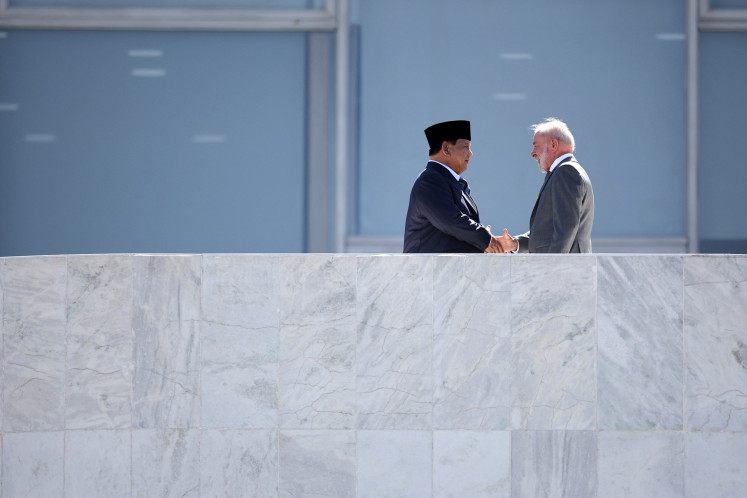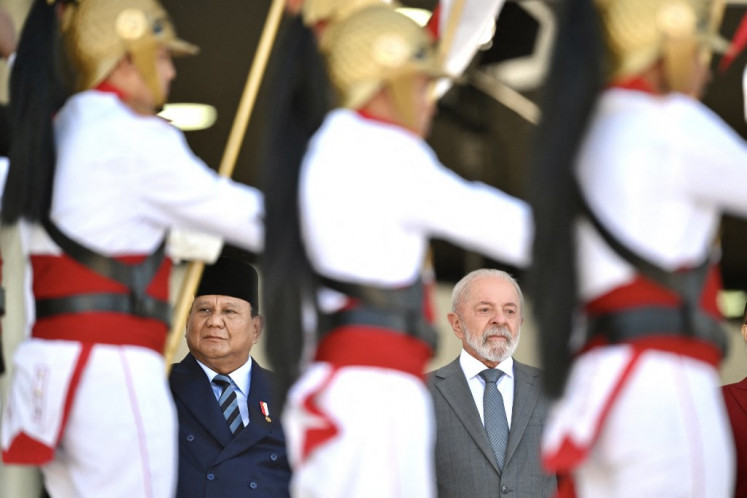Popular Reads
Top Results
Can't find what you're looking for?
View all search resultsPopular Reads
Top Results
Can't find what you're looking for?
View all search resultsJokowi urges APEC to look beyond the numbers
Attentive: President Joko “Jokowi” Widodo and Chinese President Xi Jinping attend a dialog between heads of state and the APEC Business Advisory Council in Danang, Vietnam, on Friday
Change text size
Gift Premium Articles
to Anyone
A
span class="caption">Attentive: President Joko “Jokowi” Widodo and Chinese President Xi Jinping attend a dialog between heads of state and the APEC Business Advisory Council in Danang, Vietnam, on Friday.(Antara/Yusran Uccang)
While strong economic growth is desirable, President Joko “Jokowi” Widodo has called on members of Asia Pacific Economic Cooperation (APEC) to look beyond the numbers and ensure that a vibrant economy can be enjoyed by all.
APEC’s 21 Pacific Rim economies have committed themselves to operate under open and free trade and investment until 2020, ever since the Bogor Goals were first established in 1994.
As the initial Bogor Goals will soon come to an end in 2020, Jokowi highlighted that future commitments must also focus on how increased trade and investment can help eradicate poverty and close the wage gap.
His statements on the need for the economy to have a real impact were confirmed by APEC Business Advisory Council (ABAC) Indonesia representative Anindya N. Bakrie who attended the meeting between APEC leaders and ABAC on the sidelines of the APEC Economic Leaders Week held in Danang, Vietnam.
“The President said while people have mostly talked about trade and investment, and how it has increased exponentially in the past 20 years, there is also the issue of wealth inequality that doesn’t only occur in developing countries, but also in developed countries,” said Anindya.
“The President highlighted that whatever APEC does after 2020, we have to focus on bridging the inequality gap.”
Jokowi’s call to other APEC member states is in line with the policies of his own administration, which has continued to focus on improving social and economic welfare with a “Just Economy.”
Anindya said while the global economy was in a polarized state, with the United States moving toward protectionism, China was setting itself up as a champion of globalization.
Anindya said Jokowi had called on fellow APEC members to turn their focus toward creating a maritime economy as two-thirds of the region was made up of ocean.
“ABAC itself submitted some of its own proposals. We called on [APEC] to focus more on increasing connectivity, improving financial inclusion, support the growth of small and medium enterprises and encourage more sustainable development,” he added.
Following APEC’s commitment to free trade and investment, the region has enjoyed immense and stable growth, with the World Bank estimating that East Asia and the Pacific region’s economic growth would reach 6.4 percent by the end of the year, with it dropping slightly to 6.2 percent next year.
However, Jokowi also thinks that APEC can have much to learn from ASEAN.
Deputy Foreign Minister AM Fachir quoted the President as saying that APEC and ASEAN could increase cooperation in several sectors including the development of e-commerce, human capital, and in synergizing the upcoming Free Trade Area of Asia Pacific and ASEAN’s own Regional Comprehensive Economic Partnership (RCEP).
“He [the President] said we should not only expedite RCEP, but also encourage it so that the Asia Pacific can continue to be a free trade region,” Fachir said.
APEC makes up 59 percent of the world’s gross domestic product and 47 percent of global trade.
Moreover, trade has grown 6.7 times to US$20 trillion in 2015 from 1989, and encouraged tariffs to decrease 5 percent from 16.9 percent in the same period.
However, all the good work has recently been marred by growing protectionism among member states, especially the US under the Donald Trump administration.










